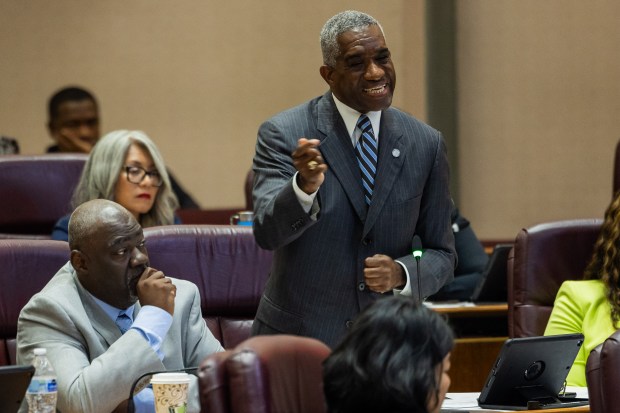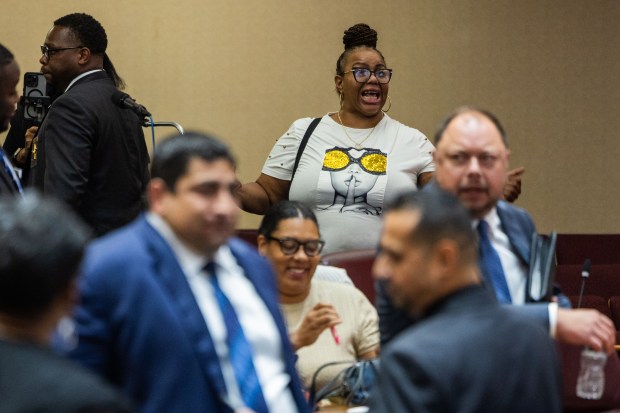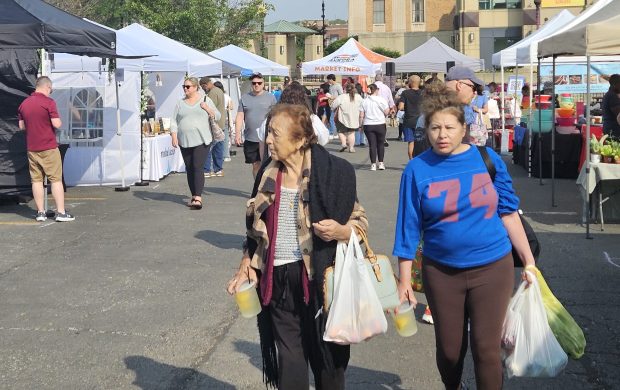Mayor Brandon Johnson is dropping his plan to veto a City Council ordinance aimed at continuing the ShotSpotter gunshot detection system he ended last month.
Johnson promised to veto the ordinance passed in a 33-to14 vote, but failed to make the move before a Wednesday morning deadline. A spokesperson told WBEZ the mayor changed plans because his administration believed the ordinance is already not legally enforceable.
But Johnson was on track to suffer an embarrassing and unprecedented defeat if the veto had gone forward.
South Side Ald. Jeanette Taylor, 20th, was absent for the September vote. She told the Tribune earlier this week she planned to vote against the mayor in a bid to keep acoustic gunshot technology in Chicago. Taylor doing so would likely mean 34 votes in favor of it, the minimum needed to override Johnson’s veto.
“We have nothing. How do we have a woman who was there for nine hours and nobody came? There has to be something in place, and they have had plenty of time to do it,” Taylor said, referring to a woman fatally shot late last month in the East Side neighborhood whose body wasn’t found until the next morning. ShotSpotter supporters say the system would have prompted a much quicker police response.
Johnson has argued the ordinance is illegal because he, and only he, has power over the city’s contracts. The September ordinance — like another passed with a veto-proof majority in May — seeks to strip Johnson of that contracting power.
The City Council was set to consider yet another similar ordinance Wednesday, with Johnson again likely to argue it is not enforceable, but the ShotSpotter proponents canceled the meeting when Johnson’s veto never materialized.
Aldermen in support of ShotSpotter are still considering suing the city if Johnson does not enforce the September ordinance, said Ald. Brian Hopkins, 2nd. Like other aldermen on his side, Hopkins called on the mayor to immediately install effective acoustic gunshot detection software, but added that it does not need to be through ShotSpotter if another company offers similar tools.
“The ball is in the mayor’s court. We will see what he does and we will respond to it,” Hopkins said.
The back-and-forth battle over the controversial gunshot detection system has swallowed up a bunch of focus in City Hall this year. That struggle only heated up late last month when Johnson executed his plan to decommission ShotSpotter.
Hours before he did so, his administration said it was launching a procurement process for apparently similar acoustic gunshot detection software. The announcement was welcome news for some aldermen who believe such technology is critically needed, but who also think it’s time to move past the tit-for-tat political sniping over ShotSpotter.
Alds. Lamont Robinson, 4th, and Walter Burnett, 27th, told the Tribune they would vote with the mayor if he vetoed the ShotSpotter ordinance, citing an expectation that both a short-term and long-term replacement for the police tool would soon come. Both aldermen were absent for the last vote and have supported ShotSpotter in past votes — and both think it’s time for City Hall to drop the debate.
“Instead of focusing on finding better technology, we’re wasting our time on divisive proposals that undermine the strong collaboration with the Chicago Police Department,” Robinson told the Tribune. “Folks are not coming together, talking.”
Robinson said the search for a ShotSpotter replacement is moving in a “better direction.” Police leaders in his South Side ward say such technology is needed, but he believes a better system than ShotSpotter can be found. As the search continues, Johnson’s team needs to make sure it is including aldermen,” he added.
“The mayor’s office is drinking from a fire house, but we have to be able to bring the City Council into these conversations,” Robinson said. “We need to get something in place as soon as possible, no questions asked.”
Johnson’s Deputy Mayor for Public Safety, Garien Gatewood, has declined to answer questions about when interim technology might be put into place. But Burnett, a close ally of the mayor’s, said one could come soon.
“[The mayor] told me that there are better products out there,” Burnett said. “He gave me the indication that he is considering something else, so I’d like to give him the opportunity to do that.”

Similar criticism of the ShotSpotter debate came weeks ago from Anthony Driver Jr., president of the Community Commission for Public Safety and Accountability. The long-running City Hall fighting has distracted from broader conversations about how to make Chicago safer, Driver said.
Now that ShotSpotter is offline, however, the need to come with a plan to fill the void has only become clearer, Driver said Wednesday. He too cited the fatal shooting of Sierra Evans, the 19-year-old discovered dead near an East Side fence apparently hours after she was shot dead.
“I’m very concerned about the current state that we’re in. I’m very concerned about people who need help not getting it,” he said. ”You can’t wing it. It’s life or death.”
But even as some grow weary of the nearly yearlong fight over ShotSpotter, proponents of the technology are plugging ahead with yet another push to keep it in Chicago. The infrastructure for the now not-running system is still up, mostly across West and South Side neighborhoods.
The Commercial Club is offering Chicago $2.5 million to help the city pay to keep the nearly $10 million-a-year system running, Ald. David Moore, 17th, announced Tuesday. Moore told the Tribune the group hopes the the mayor would take the money to keep ShotSpotter as a “stop gap” while he looks for a replacement.
However, questions about the technology’s effectiveness are only growing. An investigation published Wednesday by South Side Weekly determined ShotSpotter missed as much as 20% of reported shootings in Chicago over the last two years.
jsheridan@chicagotribune.com




